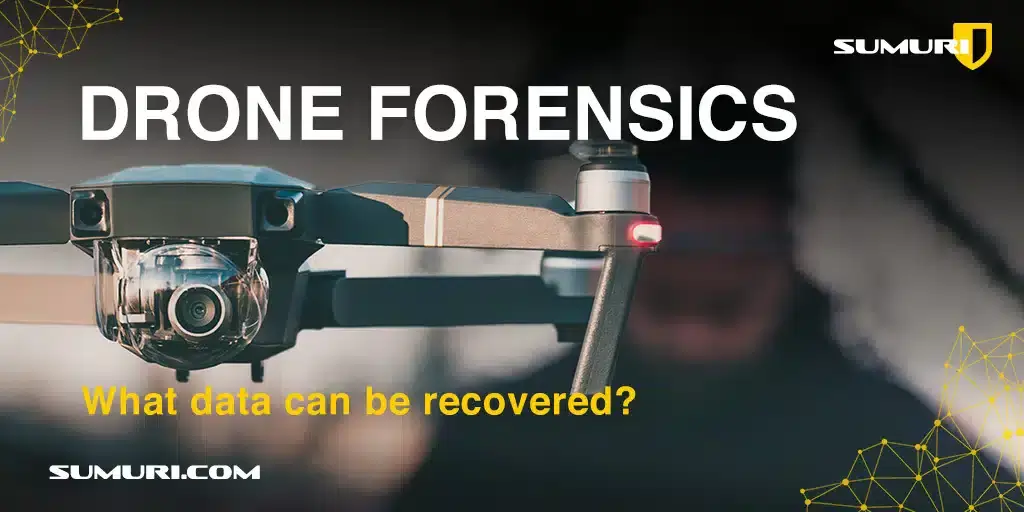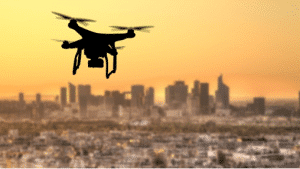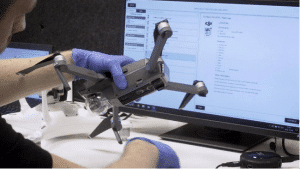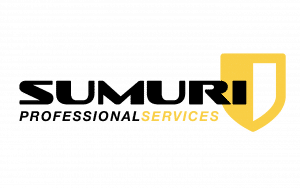

Drone Forensics | What data can be recovered?
Drone forensics, a fast-growing field, examines evidence related to unmanned aerial vehicles (UAVs), or drones. It encompasses physical evidence, like drones, and digital evidence, such as flight logs and video footage. The aim is to equip law enforcement and investigators with data for suspect identification, event reconstruction, and understanding drone-related crimes’ technical aspects.
Examining physical evidence is crucial in drone forensics, encompassing the drone, accessories, and attachments used during flight. It reveals vital details like manufacturer, model, serial number, and modifications, aiding in owner identification and determining the drone’s purpose.
Important of Drone Forensics
Examining digital evidence is another vital aspect of drone forensics, encompassing flight logs, video footage, and other stored data. Flight logs detail flight date, time, location, altitude, and speed. Video footage offers insight into the drone’s location and the actions of its operator(s).
One of the key challenges in drone forensics is the fact that many drones do not have built-in GPS or other tracking devices. This makes it difficult to determine the location of the drone at any given time, which can be critical in investigations. On April 21, 2021, the U.S. FAA officially introduced new drone Remote ID requirements. Part of compliance with the new law requires all drones to broadcast their GPS coordinates, so by October 2023 all your drones will need GPS! However, advances in technology are making it possible to track drones using other methods, such as triangulation of radio signals or analysis of video footage.
Another challenge in drone forensics is the fact that drones can be easily purchased and operated, which makes it difficult to identify suspects. However, investigators can use a variety of techniques to identify suspects. Such as analyzing video footage, interviewing witnesses, and conducting surveillance. In some cases, it may be possible to use digital evidence to identify the suspect, such as by analyzing the IP address of the device used to control the drone.
There are also legal challenges in drone forensics, as laws and regulations related to drones are still evolving. For example, there are currently no federal laws in the United States specifically addressing the use of drones for criminal activities. Senator Chuck Grassley (R-IA) introduced the Drone Act of 2022.
It currently referred to the Committee on the Judiciary of the United States Senate. A similar bill has been introduced into the United States House of Representatives as well. Neither bill has been enacted as law yet. However, investigators can use existing laws, such as those related to trespassing or privacy, to prosecute drone-related crimes.
In conclusion, drone forensics is a rapidly growing field that involves the examination and analysis of evidence related to unmanned aerial vehicles. The goal of drone forensics is to provide law enforcement and other investigators. With the information they need to identify suspects, reconstruct events, and understand the technical aspects of drone-related crimes. However, there are many challenges in this field, including the lack of built-in GPS and tracking devices.
The ease of purchasing and operating drones, and the legal challenges related to the use of drones for criminal activities. Despite these challenges, advances in technology and the development of new laws and regulations. It will help to improve the field of drone forensics and make it easier to investigate and prosecute drone-related crimes.
It is important to use a professional service provider to assist with drone forensics for several reasons. Firstly, professional service providers have the expertise and experience necessary to properly analyze and interpret the evidence collected from a drone. They have the knowledge of the latest forensic techniques, software, and equipment to effectively extract and preserve data from the drone. Secondly, professional service providers are trained to handle the sensitive and complex nature of drone-related evidence. It can include personal data, video footage, and other sensitive information.
They understand the legal requirements and regulations related to the handling of this evidence, and they can ensure that it is admissible in court. Furthermore, professional service providers have access to specialized labs, equipment and tools that are not easily accessible to general public. They are also able to provide expert testimony in court, which can be critical in cases involving drone-related crimes. In short, a professional service provider can provide a level of expertise and experience that is essential for conducting a thorough and effective drone forensic investigation. For additional information about professional service providers for drone forensics please click this link.
- By Jason Roslewicz
- Categories: Blog


Why Use a Mac for Mac Forensics











